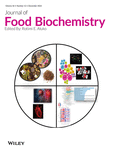Aqueous extract of Polygonatum sibiricum ameliorates glucose and lipid metabolism via PI3K/AKT signaling pathway in high-fat diet and streptozotocin-induced diabetic mice
Guangjun Wang and Zhengxiang Liu contributed equally to this work.
Abstract
This study was aimed to investigate the protective effects and elucidate the mechanisms of aqueous extract of Polygonatum sibiricum (PSAE) on glucolipid metabolism during the development of type 2 diabetes (T2DM). C57BL/6J mice fed with 60% high-fat diet (HFD) combined with streptozotocin (STZ) injection to simulate the occurrence process of T2DM. PSAE was administered daily by oral gavage during the experiment. The results demonstrated the protective effects in mice supplied with PSAE on the indicators of glycolipid metabolism (body weight, fasting blood glucose, the area under the curve, hemoglobin A1c, serum total cholesterol, triglyceride, low-density lipoprotein cholesterol, and liver triglyceride) compared with the Model group mice. Furthermore, PSAE can ameliorate insulin resistance in mice liver by activating phosphoinositide-3-kinase/protein kinase B (PI3K/AKT) pathway signaling. Overall, our research suggested that PSAE can effectively regulate glucose and lipid metabolism during the development of T2DM as an alternative functional food.
Practical applications
Diabetes is a chronic metabolic disease which is characterized by abnormal metabolism of glucose and lipoid and nowadays it has been one of the most representative chronic systemic progressive metabolic diseases. Polygonatum sibiricum is a traditional Chinese galenical and it also can be used as food ingredients. PSAE is the aqueous extract of Polygonatum sibiricum. 34% polysaccharides were detected in PSAE and it can effectively regulate glucose and lipid metabolism during the development of T2DM in mice. Thus, PSAE might be a promising functional food for regulation of glucolipid metabolism and the study also provides a theoretical basis for the development and application of food about Polygonatum sibiricum.
CONFLICT OF INTEREST
The authors declare no conflicts of interest.
Open Research
DATA AVAILABILITY STATEMENT
The data that support the findings of this study are available from the corresponding author upon reasonable request.




